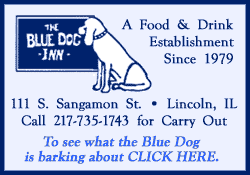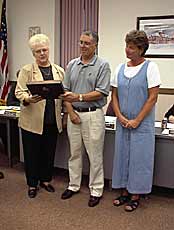|
Council
tables rezoning
of Woodlawn property
[SEPT.
7, 2000] A
motion to rezone the property owned by Glenn and Marilyn Buelter at
416 and 422 Woodlawn Road from residential to commercial was tabled
at Tuesday nightís City Council meeting by a one-vote margin.
Mayor Joan Ritter cast the deciding vote to table, saying she would
like to get the prospective developer to answer the concerns of
residents of the area before a final vote is taken.
|
|
The
rezoning would permit the construction of a 6,080-square-foot auto
parts store with 27 parking spaces on the road between Krogerís and
Palmer Avenue. The developer of the property has asked that his
identity remain confidential.
Residents
who have spoken against the rezoning say there is already traffic
congestion on Woodlawn and another commercial establishment will be a
safety hazard and devalue their property.
Perry
Harris, who lives at Fourth and Pine, not near the area, spoke in
favor of rezoning, saying encouraging business is good for the
community.

Gary
Johnston, who lives at Woodlawn and Palmer, said that expanding
commercial zoning into residential areas "doesnít make
sense."
Realtor
Dan Bock cited many areas once zoned residential that are now
successful commercial enterprises. He said people living in the
416-422 Woodlawn area told him they would not want to buy new houses
on Woodlawn because of the traffic congestion.
Alderman
Benny Huskins said he thought there was "a lot more available
property" on Woodlawn Road that could be used for business.
Alderman Patrick Madigan said infringing on residentsí quality of
life was a more important concern than building a new business.
Alderman
Steve Fuhrer said although he did not like the secrecy about the
identity of the developer, he would vote yes because he believes the
best use of the Kroger block is commercial. However, he would like to
see some type of easement so the new business and the Kroger store
could use the same access.
Alderman
Glenn Shelton said he wanted to encourage business and the area would
look "a whole lot better" with the auto parts business than
it does now. "No one wants to put a house there because of the
traffic," he said.
(To top of second
column in this article)
|

"I
wish we could make it safer," Alderman Michael Montcalm told the
council. "I think it could be developed so everyone would be
happy."
City
Attorney Jonathan Wright reminded the council that the plan commission
rejected the request, and therefore the council would have to pass it
by a two-thirds margin. He also pointed out that if the council denies
the rezoning, the owners cannot petition for another zoning change for
one year.
Voting
against tabling the motion were Aldermen Huskins, Madigan, Montcalm,
Stephen Mesner and William Melton. Aldermen Shelton, Fuhrer, Gerald
Dehner, George Mitchell and Joseph Stone voted to table.
The
council also passed resolutions of gratitude and appreciation for
retiring
Fire
Department employees Captain Terry Lessen, who has served 20 years and
six months and Assistant Chief Don Buss, who has served 31 years and 9
months.

Mayor
Ritter announced the appointment of two new planning commissioners:
Mike Miller, to replace Alderman Shelton, and Bob Wood, to replace Tom
Bevard.
Prior
to the meeting, the finance committee discussed increasing salaries
for the mayor, the city clerk and the city treasurer for the first
time since 1989. The recommendation sent to the ordinance committee
asks that the mayorís salary be increased from $10,000 to $12,000,
the treasurerís pay from $3,000 to $5,000, and the city clerkís
starting salary from $32,000 to $37,000. The clerk is the only
full-time position.
Aldermen
agreed not to recommend raising their own pay, which is $75 for a
regular meeting, $50 for a work session and $25 for special committee
meetings, not to exceed $300 per year for special meetings.
"I
think the token amount we get is fine," Alderman Montcalm said.
"This is true community service to me. We are not in it for the
money."
[Joan
Crabb]
|
|
|
Unlawful
possession
with intent to deliver
[SEPT.
7, 2000] It
started in January, eight long months ago. The watch, the build, the
wait ó there were reports, investigations, contacts and resources
set up. He gathered evidence; then day by day they watched, waited
until there was enough evidence and the time was right. Then they
made their move. Such is the standard scenario for any good drug
sting. At the end of August, Lincoln Police Department and Logan
County Sheriffís Department snagged three people on drug charges.
The arrests were made on warrants stating unlawful possession with
intent to deliver. Out of the four warrants issued, three were
brought in. The one not brought in has moved out of state.
|
|
A
task force provided the information leading to the arrests. The task
force is a Central Illinois Enforcement Group made up of 12 officers
from city or county agencies of seven central Illinois counties. It
was formed in 1990 as a division of District 9, Illinois State Police.
Mostly,
"we work street level to mid narcotics," explains the
undercover officer, who must remain anonymous. "It depends on the
sources, but we prefer to target cocaine and meth; thereís more jail
time on cocaine."
Setting
up for a sting takes lots of time, resources, and interdepartmental
and external cooperation. You can lose a few leads when you donít
act faster, as people often travel back and forth to bordering
counties, but the wait generally pays off.

The
agent in Lincoln, who began his position in 1997, has seen 50 cases,
with only two no-convictions. There were 12 caught last summer. A year
and a half ago they were able to uncover a conspiracy involving eight
people. It resulted in the interception of 20 pounds of cocaine and 40
pounds of marijuana coming down from Chicago.
(To top of second
column in this article)
|

Statistics
like these are the result of diligent case buildup and a supportive
legal system. "We work to build a good case that will lead to a
conviction," the task force officer says.
"When
we have a good case built, we can go to the stateís attorney, get
grand jury indictments, and then warrants are issued. Then we can go
pick them up. We are lucky to have great judges and stateís
attorney," praises the officer. "As a result, Logan County
sentencing is one of the strongest in the area."
It is
good to know we have a system that seems to be working for our
protection.
[Jan
Youngquist]
|
|
|
Committee
mulls city
liquor code revision
[SEPT.
7, 2000] Work
continued on amending and updating Lincolnís liquor code at a
meeting of the City Councilís ordinance and zoning committee
Wednesday evening. At least two more meetings will be needed before
public hearings can be scheduled, according to ordinance committee
chairman Glenn Shelton.
|
|
Until
the entire liquor code is revised, the meetings are not open for
public discussion, but after the rough draft is completed, public
hearings will be scheduled and comment from the public invited,
Shelton said. He said he especially wants comments from current liquor
license holders. Target date for the public hearings is October.
Much
of the work on the liquor ordinance is "housekeeping,"
according to City Attorney Jonathan Wright, updating the city code to
make it conform to state liquor statutes. The committee is studying
the liquor codes of two other Illinois municipalities, St. Charles and
Galena.

Liquor
license provisions have been the subject of controversy between the
city and Eckertís/Steffens Inc., which operates Eckertís Fine
Dining and the adjoining Grapes and Grounds shop. Eckertís/Steffens
Inc. holds a Class C liquor license for the restaurant, which the
owners believe also allows them to sell wine in the Grapes and Grounds
shop. The city contends that the firm needs a second license to sell
the package liquor. Eckertís/Steffens Inc. filed a lawsuit against
Mayor Joan Ritter, who is also liquor commissioner, but recently
dropped the suit.
One
revision to the city code up for discussion Wednesday was tavern
licenses. At present the city has only one type, which requires that
50 percent of liquor sales must be consumed on the premises. The
revision suggested would be a Tavern 1 license which would only allow
consumption of liquor on the premises, and a Tavern 2 license which
would also allow the sale of package liquor. Neither license would
hinge on the sale of food.
Club
licenses also came up for discussion, with Wright noting that to
qualify as a club, the organization had to have been in existence for
six months and maintained rooms or premises. A club can sell liquor
anywhere on its premises as long as its premises are described legally
in the application, Wright said.
(To top of second
column in this article)
|

Also
proposed was an extra license to allow live entertainment in an
establishment selling liquor. Wright said this would permit the city
to pull the entertainment license without closing the entire
establishment if the entertainment, such as bathing suit contests or
lingerie showings, became a problem.
The
question of whether to prohibit a restaurant that does not sell
alcohol from allowing customers to bring in their own beverages, which
is not addressed by the current code, also came up for discussion.
"It
has been brought up to the liquor commissioner that in all fairness to
establishments that do have a liquor license, restaurants which do not
have a license should not allow people to bring in their own
liquor," Mayor Ritter told the committee.
"Itís
been done without a problem, but some people complain," Alderman
Fuhrer noted.
Alderman
Patrick Madigan said he did not have a problem with allowing liquor to
be brought in if the establishment monitors the situation and is
properly insured.
Wright
reminded the committee that they may establish as many classifications
of liquor licenses as they wish, as long as they are not inconsistent
with the state liquor code. He pointed out that the city can make its
liquor code more restrictive than state statutes, but not less.
"If the state code says you canít sell liquor within 100 feet
of a church, you can make that 150 feet, but you canít make it 25
feet."

The
next discussion of the liquor code is scheduled for Sept. 21 at 6 p.m.
at the council chamber.
[Joan
Crabb]
|
|
|
Police
to fire noisemakers
to rid Mayfair of birds
[SEPT.
6, 2000] A
program to disperse the large flocks of birds that have become a
nuisance and a health hazard in Mayfair may begin as early as this
evening, with the firing of "bird-bangers" that explode
with a loud noise, according to Lincoln Police Chief Richard Ludolph.
The noise-making devices will be fired approximately every five
minutes from about 6:40 to 7:20 p.m. to discourage the birds from
roosting in trees in Mayfair and send them out into the countryside.
|
|
The
area in which police will be working is from Regent Street to Mayfair
Drive and south of Northgate, Ludolph said. Police officers will
conduct all the firings. The cartridges will be fired above the trees
and will not injure or kill the birds.

[Hardly a lawn is spared the leftovers as evidenced by
feathers sticking up in most lawns]
The
police chief said he had contacted the USDA and was told using the
bird-bangers "in an orderly and planned way over time" was
the most effective way of getting rid of the birds. He said it may
take a week or two of regular firings to keep the large flocks of
starlings and grackles from coming back.
The
problem was brought to the attention of the City Council last week,
when Mayfair residents spoke before a council work session. The
residents themselves had been firing the bird-bangers but had learned
that the devices violated a city noise ordinance. The City Council
amended the ordinance Tuesday evening to allow the police department
to fire the pyrotechnic devices in the city.

Ludolph
said he had visited the area and seen thousands of birds coming in to
roost and the leaves of the trees white with bird droppings. He told
the council the police department would assume the expense of
purchasing the "bangers" and the launchers. Several Mayfair
residents who attended the meeting said they would be happy to give
the police department the launchers and cartridges they have already
purchased so the program can start immediately.
(To top of second
column in this article)
|
The
councilís action amends the ordinance so that the police department
may use the noise-making devices whenever they determine the birds are
a health hazard. The public is to be notified ahead of time whenever
possible. Some residents have complained that the noise frightens pets
and prevents them from sitting outside.
Mayfair
resident John Brown said the bird situation has become worse over the
years and residents can no longer handle it alone. Patricia Birk, who
spoke last week, said she and her husband had to use masks and rubber
gloves to clean up the leaves in their yard. She suggested residents
be allowed to use the bird-bangers if the police department did not
have enough manpower to carry out the program.

One
Mayfair resident, Mary Gupton, objected to the program. "Itís
very annoying to sit outside in the evening and hear shotgun shells. I
think this is unnecessary. They should either cut the trees down so
the birds donít have a place to roost, or move out."
[Joan
Crabb]
|
|
|
ILLINI
BANK
2201
Woodlawn Rd. in Lincoln
1-888-455-4641 or 735-5400
Ask for Terry Lock or Sharon Awe Ask
about our 6.9% APY
11 mos. CD |
Claire's
Needleworks
and Frame Shop
"We
Frame It All"
On the square
in downtown Lincoln
217-732-8811
M-F 10-5 Sat 10-4
cmstitches@aol.com |
Meador
Investigations
Ė michael@pi-pro.com Ė
217-376-3255
IL
License # 115-001499
Click
here to visit your local Private Investigator
www.pi-pro.com
|
|
|
|
Mayor
Joan Ritter
seeks second term
[SEPT.
6, 2000] Lincolnís
current mayor, Joan C. Ritter, announced this morning she will run
for a second four-year term in the upcoming election Feb. 27, 2001.
She made the formal announcement at a brief press conference at 8:30
a.m. under the arch at the newly restored Scully Park.
|
|
Ms.
Ritter introduced her re-election committee: Judy Awe, chairman; Fuzz
Werth, publicity director; Gary Beaver Newman, field operator; and
John Beard, treasurer. About a dozen supporters also turned out for
the announcement.

[Mayor
Joan Ritter presented a plaque to Dave Campbell at Tuesdayís City
Council meeting to thank him for his 12 years as chairman of the
annual Balloon Fest.
Campbell said he and his wife (right) were not natives but had
chosen to live in Lincoln and wanted to help ďshowcase the place we
are proud of.Ē ]
Ms.
Ritter said she has found it "an honor and a privilege"
serving as mayor and called Lincoln "a great place to live and
raise a family."
She said
she would run on her record and cited several projects she had enjoyed
being part of, such as working to bring in new businesses to the
community and helping current ones expand and progress.
She said
she had enjoyed working with community-based organizations like the
Healthy Communities Partnership "to help improve the quality of
life for all Lincolnís citizens" as well as "helping to
complete much needed infrastructure projects," such as the
current road construction program.
(To top of second
column in this article)

|

She also
said she had enjoyed "being part of the process to advance and
upgrade our city police, fire, street and alley, sewer treatment
plant, engineering and zoning departments." She pointed out that
the city had received several grants for police equipment and for the
violence prevention program sponsored by the police department, as
well as grants for fire department equipment and street improvements.
She
cited helping with "efforts to expand our local colleges"
and noted that the city had assisted Lincoln College in getting
revenue bonds to finance its current building projects.

"But
most of all, it is the enjoyment of working with the greatest people
around as we strive to reach common goals," she told the group.
At a
recent City Council meeting, Ritter said she believed Lincoln
was "large enough to have a full-time mayor" and might need
one in the future. The position is currently considered part time and
carries a salary of $10,000 a year, although the City Council is
considering raising that figure to $12,000.
"I
think the people in this community know that I am a full-time
mayor," she said. "I will do that no matter what the salary
is. If the hours happen to be 10 to12 a day, thatís what I will put
in."
The only other mayoral
candidate who has announced as of now is Stephen Mesner, second ward
alderman.
[Joan
Crabb]
|
|
Lincoln
Ag Center
1441 State
Route 10 East
Lincoln, IL
217-732-7948 We
support Lincolndailynews.com! Click
here to visit our website!!! |
Lincolndailynews.com is
the place to advertise
Call (217) 732-7443
or e-mail
ads@lincolndailynews.com
|
25
Cents per
Gallon
Self-vendored
reverse osmosis water The
Culligan
Fresh Water Station 318
N. Chicago St., Lincoln |
|
|
|



